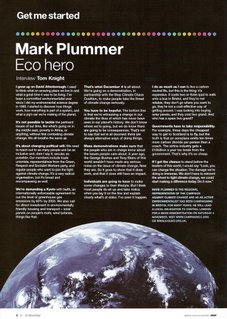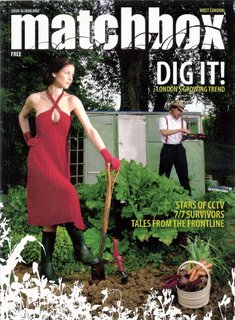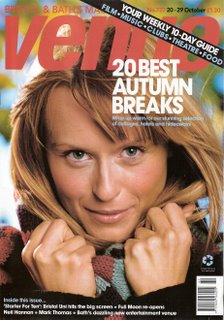December 27, 2012
November 18, 2006
The Plymouth Evening Herald
Cuttings from the Plymouth Evening Herald, where I spent a week on the news desk (Nov 13-17).

My placement was a far more sedate experience than I had anticipated, although I did get the chance to meet Viscount Rothermere, the owner of the Daily Mail and General Trust (and the Northcliffe group, of which the Herald was a part), and Alistair Darling, Secretary of State for Trade and Industry (see previous post).





November 17, 2006
Alistair Darling in Plymouth
A largely uneventful Monday began a largely uneventful week, although in the afternoon I did get the chance to shake hands and observe a face-to-face interview with the Trade Secretary, Alistair Darling.

 He was in town to kick-start Plymouth Enterprise Week - a joint initiative between local government and the technological, industrial and commercial sectors - designed to promote the city as a centre of innovation. His was a flying visit to the Tamar Science Park, where he was scheduled (down to the minute) to meet various managing directors, project leaders and executives of companies that had been successful in both producing exportable products and raising the profile of the local economy. Liz Parks, the Business Reporter at the Evening Herald, invited me along to shadow her as she chased an interview.
He was in town to kick-start Plymouth Enterprise Week - a joint initiative between local government and the technological, industrial and commercial sectors - designed to promote the city as a centre of innovation. His was a flying visit to the Tamar Science Park, where he was scheduled (down to the minute) to meet various managing directors, project leaders and executives of companies that had been successful in both producing exportable products and raising the profile of the local economy. Liz Parks, the Business Reporter at the Evening Herald, invited me along to shadow her as she chased an interview.10am, and we stood in a reception foyer as part of a growing press corps. Opposite us was the official welcoming party, consisting of the Tamar's chairman, his head of marketing, two prominent local MPs and their people. There was plenty of handshaking.
"They're like flies around a piece of shit," muttered a business reporter from the Western Morning News (Devon and Cornwall), commenting on the sizable entourage that swept through the door, behind Darling. (It turned out he had an axe to grind, and was gearing up for a confrontational interview). Together they really did appear as gangsters, complete with all the cliches: A sharp eyed young PR coordinator shouted into his executive mobile phone, a beautiful, olive-skinned personal secretary with immaculate hair and shining jewelry stood silently to one side, ready to second guess her boss's every movement. The two MPs began fawning, clamouring for attention, desperate to ensure that the New Labour machine in London (personified by this silver-tonged, permatanned Scot) did not forget about its provincial ambassadors.
Photographers scurried, hanging from railings and kneeling down, looking for angles and snapping. The minister acknowledged the reporters last of all. He seemed to loosen up momentarily as he waved.
"Hi everyone," he called out. "I've only got time to speak to you briefly afterwards, is that alright?"
The tour was going to last an hour. We were content to join the train and follow their lead.
The scrum squeezed through the complex to pay the planned visits. These included an engineering form that was developing health monitors for babies and a technology research company that was pioneering techniques of 3D rendering on resin. At each presentation, Darling demonstrated deep understanding and interest, engaging in conversation as the group around him scribbled notes, played with PDAs, changed lenses, relayed messages and so on.
Incredible, the political animal. Forever on the move, chained to The Party, micro-managed down to the smallest behaviour, demanding, always engaging but never engaged. When a difficult question or criticism arose, it was deflected almost subliminally. Craftsmanship, maybe, but it's easy to imagine that professional politicians are born, not made.
At interview, Darling was amiable, but vacant. As he rattled through a clutch of prepared answers, I was surprised that Liz didn't push him further, perhaps question his opinion on the proposals for Devonport (the ancient harbour was under threat of downgrading, threatening the oldest industry in Plymouth). Instead, questions were limited to - "Do you like Plymouth?", "What are your impressions of today?", "What are your priorities?", lines of enquiry which invited political tact, not the truth.
She told me afterwards that, as time was limited, she couldn't risk deflections. A printable quote was, after all, the goal. I discovered later that the reporter from the Western Morning News, who challenged him over job cuts in Cornwall food production, was discourteously rebuffed and came away with nothing.
Journalism at this level is thus something of a balancing act; between editorial freedom and freedom of access. No new lesson there, but when you see it all played out in front of you, the politician's effectiveness in turning the press into a tool for his own publicity is still surprising.
Plenty of lessons still to learn.
November 09, 2006
The Eco Warrior and the Week-Long Hangover
 Continuing the 'activism' theme, my submissions to Venue #739 included an interview with Mark Plummer, a local environmentalist who first became known for his protests surrounding the expansion of Bristol Airport in 1999. I interviewed him as he was busy preparing to lead a regional delegation of the Stop Climate Chaos campaign group to London for the major demonstration on November 4.
Continuing the 'activism' theme, my submissions to Venue #739 included an interview with Mark Plummer, a local environmentalist who first became known for his protests surrounding the expansion of Bristol Airport in 1999. I interviewed him as he was busy preparing to lead a regional delegation of the Stop Climate Chaos campaign group to London for the major demonstration on November 4.
However, this issue my biggest contribution was for a main feature, designed to introduce new students to the various pub crawls that can be found around town. Between us, the assistant editor (Joe Spurgeon) and I devised the routes, experienced them first hand and reviewed them, with emphasis being put on the characters we met along the way. I was responsible for three, covering my neighbourhood (Clifton Village), the City Centre and north of the city along the Gloucester Road. I think Chris Dickason's illustrations are great.






November 07, 2006
Ian Bone and The Bristolian
 Until last year Bristol had its own independently produced, subversive political newsletter called "The Bristolian", under the authorship of Ian Bone. Despite a healthy readership and critical success (it was the runner-up at the Paul Foot Awards for investigative journalism in 2005), it ceased publication following years of accusations of misrepresentation and slander. Illustrating how sharply opinion was split over The Bristolian, a visitor to the Bristol Indymedia opined at the time that it was a a "nasty evil filthy little rag" and that "the longterm effect of things like this is to put people off doing anything and to encourage everyone else to sneer and get cynical instead of getting off their arses and working with their neighbours." Bone himself, once a well known character in Bristol, retreated from the media spotlight.
Until last year Bristol had its own independently produced, subversive political newsletter called "The Bristolian", under the authorship of Ian Bone. Despite a healthy readership and critical success (it was the runner-up at the Paul Foot Awards for investigative journalism in 2005), it ceased publication following years of accusations of misrepresentation and slander. Illustrating how sharply opinion was split over The Bristolian, a visitor to the Bristol Indymedia opined at the time that it was a a "nasty evil filthy little rag" and that "the longterm effect of things like this is to put people off doing anything and to encourage everyone else to sneer and get cynical instead of getting off their arses and working with their neighbours." Bone himself, once a well known character in Bristol, retreated from the media spotlight.This article, written by veteran BEP journalist Eugene Byrne and published in Venue #728, covers the decline of The Bristolian and the seeds of Bone's personal philosophy. I did the support work on it, and it's an interesting read, so I'm posting it here. Working with Byrne was a real education, not least because his approach to interview subjects is uncompromising and highly effective. Starting the telephone interview, he asked Ian Bone if he was ready for his first question. "Let me guess" condescended Bone, "you're going to ask me if I condone violence?".
"No, I'm going to start with the easy stuff first," he replied. "Then I'm going to find out if you really are the most obnoxious man on the planet".


November 04, 2006
Matchbox Magazine
 As part of an ongoing agreement, Mandy and I contribute a 6 page DPS covering Events to Matchbox Magazine, a free bimonthly lifestyle magazine that circulates west London.
As part of an ongoing agreement, Mandy and I contribute a 6 page DPS covering Events to Matchbox Magazine, a free bimonthly lifestyle magazine that circulates west London.All told, the collection of suitable events (from our own listings, PR timetables and other areas), copy writing and obtaining suitable images takes both of us about a day (notwithstanding delays caused by communication breakdowns, which are inevitable). Two example pages are below.




